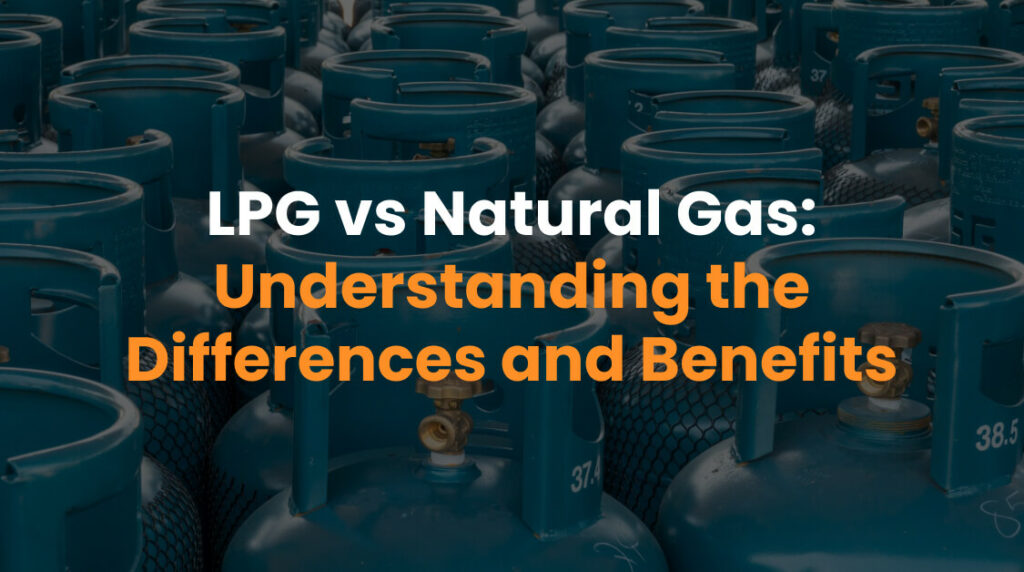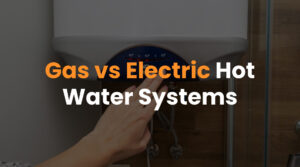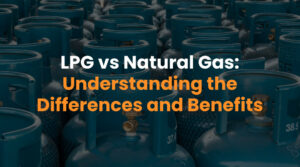When it comes to heating, cooking, or powering appliances, the choice between Liquefied Petroleum Gas (LPG) and natural gas is significant. Both fuels are popular energy sources, yet they differ in composition, cost, availability, and environmental impact. This post by Plumbwell Plumbing Services delves into the nuances of natural gas vs LPG, offering insights to help you make an informed decision based on your energy needs, location, and preferences.
The Composition of LPG and Natural Gas
LPG and natural gas are both critical sources of energy but vary significantly in their composition and form.
- Natural Gas: Primarily methane, with small amounts of other hydrocarbons, natural gas is lighter than air. It’s extracted from gas fields or in conjunction with crude oil production. The gas network transports it in its gaseous state through pipelines.
- LPG (Liquefied Petroleum Gas): LPG is mainly composed of propane and butane, heavier hydrocarbons that can be liquefied under pressure. It’s produced from refining crude oil or extracting natural gas. LPG is stored and transported in cylinders or tanks.
This distinction in composition directly influences how and where each fuel can be used, their storage and transport requirements, and their suitability for various applications.
LPG vs Natural Gas: Key Differences
Source and Production
- Natural Gas: Extracted directly from gas fields, natural gas undergoes minimal processing before it enters the gas network, making it widely available to areas connected to the supply network.
- LPG: LPG is produced during natural gas processing and crude oil refining. It’s stored in cylinders and requires specific handling and storage facilities.
Energy Content and Efficiency
- Natural Gas: Has a lower energy content compared to LPG, meaning you might use more of it to achieve the same heating level. However, its direct supply through pipelines makes it a convenient and constant energy source.
- LPG: Boasts a higher energy content, making it more efficient for heating and cooking. This efficiency comes from its composition (propane and butane), providing more energy per cubic meter than methane.
Cost and Accessibility
- Natural Gas: Often cheaper than LPG due to lower supply charges and the absence of delivery costs. Its price advantage is most notable in regions with an established gas network.
- LPG: While potentially more expensive due to refining and transportation costs, LPG is accessible everywhere, especially in areas without a natural gas supply.
Environmental Impact
- Natural Gas: Produces fewer emissions than LPG when burned, making it a cleaner choice for the environment. Its primary component, methane, however, is a potent greenhouse gas if released unburned.
- LPG: Though it burns relatively cleanly, producing less carbon dioxide than other fossil fuels, its production and the potential for leaks contribute to environmental concerns.
Environmental Impact of LPG and Natural Gas
In the quest for sustainable energy solutions, the environmental footprint of our fuel choices, including LPG (liquefied petroleum gas) and natural gas, cannot be overlooked. Both fuels are pivotal in transitioning away from more polluting energy sources, yet they differ in their environmental implications.
Carbon Emissions
Both LPG and natural gas are fossil fuels, but their impact on carbon emissions varies significantly.
- Natural Gas: Composed mostly of methane gas, natural gas burns cleaner than coal or oil, producing fewer carbon emissions and serving as a bridge fuel towards renewable energy sources. However, methane’s high potency as a greenhouse gas can negate its benefits if leaked.
- LPG: As a mixture of propane and butane, LPG emits more CO2 per unit of energy than natural gas but less than other fossil fuels, positioning it as a comparatively cleaner option for off-grid energy needs.
Production and Refining
The environmental toll of extracting and processing these gases plays a critical role in assessing their overall sustainability.
- Natural Gas: The extraction process, particularly fracking, raises concerns about water use, potential contamination, and methane leaks, challenging its clean energy profile.
- LPG: Derived from natural gas processing and oil refining, the environmental impact of LPG is tied to the extraction and refinement of these primary resources, with efforts to limit negative effects through improved practices.
Cost Comparison: Is LPG Cheaper Than Natural Gas?
The debate over the cost-effectiveness of LPG versus natural gas involves several factors, from supply mechanisms to the energy content of each fuel.
Supply and Infrastructure
Access to and the cost of gas are heavily influenced by the existing infrastructure and the user’s location.
- Natural Gas: Often viewed as more economical for consumers connected to the mains gas network, its cost benefits are largely due to the extensive gas distribution system and lower supply charges.
- LPG: The expense of LPG reflects not only the price of the gas itself but also the logistics of delivery and the necessity for storage solutions, such as gas bottles or cylinders, making it costlier but essential in areas beyond the reach of the natural gas network.
Usage and Efficiency
The amount of gas used and its conversion into energy are key components in determining the cost-efficiency of LPG and natural gas.
- Natural Gas: Its widespread use for cooking, heating, and water heating in homes and businesses leverages its direct delivery but requires more volume to match the energy output of LPG.
- LPG: Praised for its higher calorific value, LPG delivers more energy per unit, potentially reducing the total volume of gas needed, though this advantage may be offset by its higher unit cost compared to natural gas.
Safety Considerations for LPG and Natural Gas
Ensuring the safe use of LPG and natural gas within residential and commercial settings is critical, with specific measures necessary to mitigate risks.
Leak Risks
The physical properties of these gases influence their behaviour in the event of a leak, affecting safety protocols.
- Natural Gas: Being lighter than air, methane gas can quickly dissipate, which reduces the risk of explosion but necessitates vigilant leak detection to prevent environmental release.
- LPG: Its heavier-than-air nature means LPG can pool in low-lying areas, increasing the risk of explosion if not properly ventilated or if leaks go undetected.
Gas Appliances and Fittings
Proper maintenance and regular safety checks are paramount for all gas-powered systems.
- Both Gases: Appliances fuelled by either natural gas or LPG require periodic inspections by certified gas fitters to ensure they operate safely and efficiently. This includes everything from cooktops to water heating systems, emphasising the need for professional oversight.
Storage and Distribution
The method of getting the gas from the supplier to the consumer has inherent safety considerations.
- Natural Gas: The convenience of being connected to the mains gas network comes with the responsibility to maintain gas lines and ensure appliances are compatible with the type of gas used.
- LPG: The storage of LPG in cylinders or tanks under high pressure necessitates stringent safety measures, from the correct handling of gas bottles to regular checks by suppliers to ensure the integrity of the storage system.
Choosing Between LPG and Natural Gas for Your Needs
The core distinction between natural gas and LPG lies in their composition; natural gas is primarily methane gas, making it lighter and easily distributed through the gas network, while LPG, a mixture of propane and butane, is denser and stored under pressure in gas cylinders. This fundamental difference impacts their storage, distribution, and usage in homes and businesses.
Evaluating Availability and Cost
Accessibility to natural gas is generally determined by your proximity to the gas mains network. For those in remote areas without direct access, LPG offers a versatile alternative, albeit with the additional consideration of managing gas bottles or cylinders. While natural gas is generally cheaper due to lower supply charges and continuous supply, the cost of LPG can vary based on supplier prices and the amount of gas used. Elgas and other LPG suppliers provide valuable resources through platforms like the Elgas Knowledge Hub to help consumers understand their usage and manage costs effectively.
Energy Needs and Efficiency
When deciding between using natural gas or LPG, consider your energy requirements. LPG contains more heat energy compared to an equal volume of natural gas, making it more efficient for heating and cooking applications where less gas is used to produce the same amount of heat. However, the annual cost of fuel should also factor into your decision, with natural gas generally presenting a lower cost for continuous supply.
Environmental Considerations
Both LPG and natural gas are cleaner alternatives to other fossil fuels like coal and oil, with natural gas producing less CO2 emissions. However, the production and refining process for LPG, as well as methane leakage from natural gas, pose environmental concerns. The choice between the two may also depend on your stance towards environmental impact and sustainable energy sources.
The Future of Gas: LPG and Natural Gas Trends
The gas industry is at a crossroads, with significant shifts towards renewable energy sources challenging the traditional reliance on fossil fuels. However, both LPG and natural gas are poised to play crucial transitional roles. Innovations in liquefied natural gas (LNG) technology and biogas, alongside more efficient gas appliances, signal a future where gas continues to be a vital, albeit changing, part of our energy landscape.
Conclusion: Making an Informed Decision on LPG vs Natural Gas
Choosing between LPG and natural gas depends on a variety of factors, including availability, cost, energy needs, and environmental impact. Understanding the differences between the two allows you to make an informed decision that aligns with your specific circumstances and values. Whether you opt for the widespread availability and lower cost of natural gas or the higher energy content and flexibility of LPG, both options offer reliable and efficient energy solutions for today’s homes and businesses.








